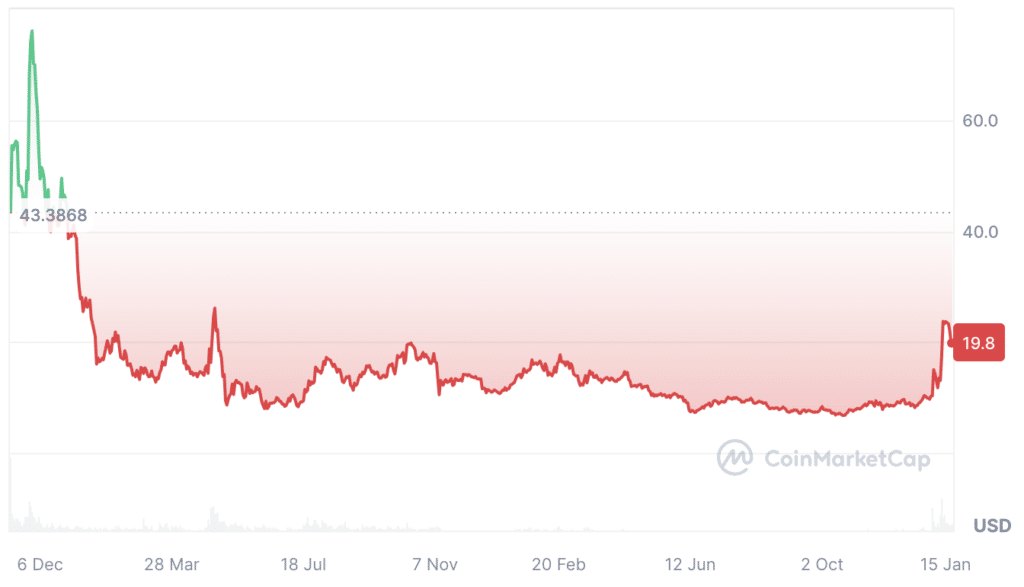What is Ethereum Name Service? A closer look at ENS amid recent token surge

Explore Ethereum Name Service (ENS) future prospects, its growth and the evolving role in the web3 and crypto space.
Table of Contents
Recently, the Ethereum Name Service (ENS) has seen a remarkable surge in its market performance, capturing the crypto community’s attention. This surge is closely linked to ENS domains’ growing popularity and utility within the crypto ecosystem.
In early Jan. 2024, Ethereum’s (ETH) co-founder Vitalik Buterin highlighted the importance of ENS in the broader Ethereum landscape, prompting a notable boost in trading activity surrounding the ENS token price.
As of Jan. 19, the ENS token is valued at around $19, a notable increase from its all-time low of $6.70 in Oct. 2023.
However, it’s essential to note that the ENS token is currently rebounding from a significant decline. Previously, in November 2021, the ENS token reached its peak value at $85.69.

The current market activity around ENS tokens and domains suggests a renewed interest and optimism in ENS within the crypto space.
Let’s dive deeper into ENS and try to understand what it is, how it works, and how it could impact crypto and Ethereum in 2024.
What is Ethereum Name Service (ENS)?
The Ethereum Name Service (ENS) is a vital component in the ENS blockchain ecosystem, providing a user-friendly interface to the otherwise complex and technical blockchain addresses.
ENS’s primary function is to convert complex Ethereum addresses, which are typically long strings of numbers and letters, into human-readable names.
This service resembles the Domain Name System (DNS) used on the internet but is tailored for the decentralized nature of the blockchain.
Consider a scenario where you want to receive Ethereum (ETH) as payment. Traditionally, this transaction would require you to share your Ethereum wallet address. These addresses are typically a string of 42 hexadecimal characters, which can be complex and prone to errors when shared or entered.
For instance, an Ethereum address might look something like this:
0x6310ae27e35D2d850eE1913E0447c0cc85Eb1Cdf
This is where the ENS cryptocurrency becomes invaluable. ENS resolves the challenge of remembering and correctly using these complex addresses.
Instead of relying on the long string of characters, ENS allows users to represent their Ethereum address with a simple, memorable name.
So, instead of sharing a string of characters, you can simply use an ENS domain like garygensler.eth.
This transformation significantly reduces the risk of errors in transactions and makes the process of sending and receiving digital assets more user-friendly.
How does ENS work?
ENS operates using two key smart contracts: the ENS registry and resolvers.
The ENS registry maintains a list of all domains and subdomains, storing crucial information like the domain owner, the domain resolver, and the caching time for records under the domain.
The resolvers, on the other hand, are responsible for the actual process of translating names into addresses and vice versa.
ENS enhances security and reduces the risk of errors in transactions. It is more resistant to censorship and hacking attacks compared to traditional DNS due to its decentralized nature.
Furthermore, ENS domains have increased in value and popularity, with shorter names being particularly rare and sought after.
Getting an ENS domain is relatively simple: you can check for availability and register a domain through their website. The cost of obtaining and maintaining an ENS domain includes auction costs for popular names and an annual renewal fee, payable in Ethereum.
ENS governance is community-driven through a Decentralized Autonomous Organization (DAO), where ENS token holders can submit proposals and vote on decisions affecting the protocol.
These tokens are used for protocol governance and influence decisions on pricing and other operational aspects.
Use cases of ENS
The Ethereum Name Service (ENS) offers several practical use cases besides transforming complex Ethereum addresses into user-friendly domain names. These include:
Decentralized websites: ENS enables the launch of censorship-resistant websites on decentralized networks like IPFS (InterPlanetary File System). This feature is especially important for content creators and businesses seeking to establish an online presence immune to centralized control or censorship.
Identity management on the blockchain: ENS allows users to attach personal information, such as an email address or an avatar, to their ENS username. This capability could make ENS-enabled usernames a primary digital identity on the web, enhancing the way we interact online.
Subdomain creation: ENS domain owners have the flexibility to create subdomains. These subdomains can be used for various purposes, including directing to smart contracts, transactions, or metadata. This feature offers a level of customization and control that can be particularly useful for businesses and developers operating in the blockchain ecosystem.
Enhanced security and transparency: The decentralized nature of ENS, being built on the Ethereum blockchain, makes it more secure and less susceptible to hacking compared to traditional DNS systems. This enhanced security is critical for users and businesses that prioritize the safety of their digital identities and transactions.
What to expect from ENS in 2024?
Based on the current trajectory and emerging patterns in the ENS cryptocurrency markets, here’s an analysis of what to expect:
Growth in registrations and renewals
ENS has demonstrated a strong performance in recent months, with significant growth in domain registrations and renewals.
This trend could likely continue into 2024, fueled by the increasing perception of ENS domains as valuable digital assets.
The growth in registrations, especially for more affordable 4+ character domains, indicates a broadening user base. Renewals of exclusively priced shorter names also suggest a strong, loyal user base within the ENS ecosystem
Increasing integration and adoption
The integration of ENS into various blockchain platforms and services like decentralized apps (dapps) and decentralized exchanges (DEXs) could progress.
As ENS simplifies the user experience in the Ethereum-based web, its adoption could rise, especially among new users entering the cryptocurrency space.
The adoption rate could be a significant factor driving the ENS crypto price and the utility of the service.
ENS’s role in web3 and digital identity
ENS’s importance in the web3 space could also grow. Its role in linking human-readable names to blockchain assets positions it as a useful element for web3 identity protocols.
This utility extends beyond mere address simplification and plays into broader themes of digital identity and decentralized internet.
Future trajectory
As Ethereum continues to grow, the ENS is poised to expand alongside it. The increasing adoption of Ethereum for various applications, including decentralized finance (defi) and non-fungible tokens (NFTs), could drive more users towards ENS for easier and more secure interactions on the Ethereum blockchain.
Currently, around 2.1 million .eth ENS names have been registered.
As the Ethereum ecosystem evolves with the latest Dencun upgrade, ENS could play a strong role in enhancing user experience and accessibility, potentially leading to broader adoption and integration within the blockchain space.
FAQs
How to buy an ENS domain?
To buy an ENS domain, you’ll need to follow a series of steps:
Acquire ETH: First, you need to have ETH in your account since ENS domains are purchased with ETH. You can buy ETH through centralized and decentralized exchanges.
Set up a crypto wallet: Next, you’ll need a crypto wallet that supports Ethereum, like MetaMask. This wallet is where your ENS domain will point to and is necessary for interacting with the ENS system.
Connect to the ENS dApp: With ETH in your wallet, navigate to the ENS dapp (app.ens.domains). Connect your wallet to the dApp.
Choose your ENS domain: Search for your desired domain name in the ENS dApp. If it’s available, you can proceed with the purchase. If it’s already taken, you might have to look for alternatives or buy it on the secondary market.
Complete the purchase: Follow the instructions in the dApp to register and purchase your domain. This process will include paying the registration fee and any applicable gas fees.
Why buy an ENS token?
Purchasing ENS token can be a strategic move for those looking to participate in the governance of the ENS protocol. Holding ENS token allows users to vote on key decisions and contribute to the development of the ENS ecosystem. However, it’s essential to exercise caution. Like any cryptocurrency investment, ENS token is subject to market volatility, which can lead to significant price fluctuations. You should conduct thorough research, consider the inherent risks of crypto investments, and only invest what you can afford to lose.

















